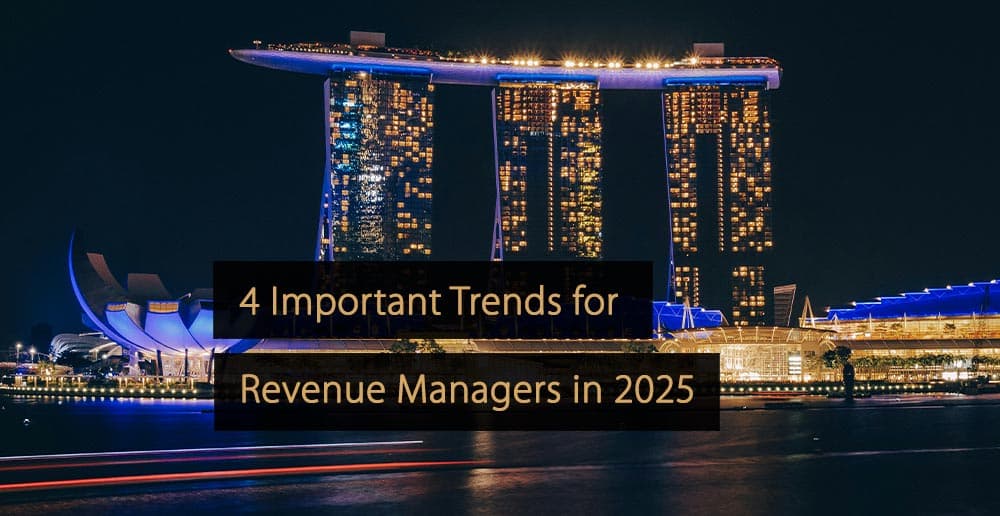Question for Our Revenue Management Expert Panel:
Are the recent booking condition changes (e.g. increased flexibility around cancellation policies, check-in and check-out) a temporary solution or a more permanent change for the hospitality industry?
Industry Expert Panel
Our Industry Expert Panel exists out of professionals within the hospitality & travel Industry. They have comprehensive and detailed knowledge, experience in practice or management and are forward-thinking. They are answering questions about the state of the industry. They share their insights on topics like revenue management, marketing, operations, technology and discuss the latest trends.
Our Revenue Management Expert Panel
- Christoph Hütter – Revenue Strategy Consultant, Christoph Hütter Revenue Management
- Patrick Wimble – Managing Director, Lightbulb Consulting
- Theresa Prins – Founder, Revenue Resolutions
- Kevin Paateyl – Corporate Director of Revenue, Everwood Hospitality Partners
- Heiko Rieder – Vice President Revenue Management and Reservations, Penta Hotels
- Karin van Rhee -Lecturer, Hotel Management School Maastricht
- Pablo Torres – Hotel Consultant, TSA Solutions
- Edyta Walczak – Cluster Revenue Manager, Arora Hotels
- Thibault Catala – Founder, Catala Consulting
- Tanya Hadwick – Group Revenue & Yield Leader, SunSwept Resorts
- Celine Quek – Senior Lecturer, School of Hospitality at Republic Polytechnic
- Silvia Cantarella – Revenue Management Consultant, Revenue Acrobats
- Massimiliano Terzulli – Revenue Managent Consultant, Franco Grasso Revenue Team
- Dian Tristyanti – Revenue Management Professional
- Jutta Moore – Director, Moore Hotel Consulting
- Ask Our Panel a Question
- Join Our Expert Panel
“The current level of flexible conditions is going to disappear once we leave the pandemic behind us. That said, I can imagine that we will see more modifiable rates (i.e. non-refundable rates which allow date changes) to a greater extent.
Another outcome could be an increased awareness among hoteliers and revenue managers of the opportunity around cancellation policies. We need to remember that a rate is not just the price but rather a package of price, restrictions, inclusions and policies.”
“I believe that a degree of enhanced flexibility is going to be part of our world for at least a year to two years. This will depend on several things, namely:
- The segments using your hotel. For example, leisure guests who are paying their own accounts will likely be the last who want to relinquish that flexibility. However, corporate clients might be more willing to give it up earlier as confidence builds back to some semblance of normal and their travel patterns start to become more predictable. Broadly speaking, I believe groups will continue to push to keep flexibility but this is likely to be less COVID related and more to do with their demand for flexibility anyway. Groups clients are likely to be the ones to dig their heels in and play one hotel off against another in terms of what each is offering on contract terms as they know that any group business will likely be hard-fought over in competitive markets.
- Where your customers are coming from will also likely drive their need for flexibility. For example, if you are a hotel in London with predominantly European business historically, local vaccine rollout in their respective countries, localised COVID breakouts and local travel restrictions will all drive the customers’ need for flexibility. Revenue managers need to take this into account when reviewing changes to that flexibility.
I think it’s likely that free cancellation and simple re-booking processes are likely to remain in place the longest. If any investment has taken place on websites etc. to enable a simplified re-booking process, why would you stop offering this? I think hotels will be able to start offering some form of discounted rates with a light fence (i.e., pre-pay first night’s stay but allowing some flexibility on arrival date) and this could start to work sooner rather than others, especially with some leisure guests.”
“As demand strengthens, we will see the return of stricter policies again, especially where demand is not so easy to replace. In properties where there is a high turnover in demand and feet through the door, the flexible approach will be more permanent. We have already observed the likes of Non-Refundable rates returning, although a little watered down than before. For instance, Non-Refundable Rates now has a grace period where they can still cancel free-of-charge and then after that point it is non-refundable. Variations of what we used to do and what we are doing now will come into play.
The ease-of-doing-business changes are more permanent, for example, easy re-booking processes, grace periods in booking conditions, online check-in, no touchpoints (e.g., door lock, tv remotes, etc.).”
“Flexibility is not a term that is typically associated with non-refundable reservations. The industry will continue to focus on the non-refundable part and at the same time, ease on the date of stay. I think the industry will allow guest to use their pre-payment as a credit towards rebooking. This would result in a win-win for both guests and the hotel. The guests do not lose their money, and the hotel’s marketing spend to capture the guest is not lost. While we have seen an increase in flexibility requests on the MICE side, we believe this is only a short-term trend.
Currently, event organizers are concerned about last-minute changes to travel policies and government restrictions that would impact attendees. However, MICE requires much behind-the-scenes planning and coordination to execute successfully. It is not easy for both the event planner and venues to implement flexibility beyond a certain point.”
“I think it will take several years for some of the flexible options to return to the pre-pandemic levels. For instance, the cancellation deadline for flexible tariffs has been changed in most marketplaces to same-day or even 6 pm, whereas some global brands have started to extend those deadlines by up to 3 or even 5 days, which is likely to take a long time to be re-deployed.
On the other hand, some measures have been removed again during the pandemic. The last benchmark we did for our European markets showed that at the end of last year, most hotels had started to sell pre-paid rates again. I foresee that we’ll keep our voucher model (i.e., offering vouchers instead of accepting free-of-charge cancellations of pre-paid bookings) valid for at least another year, and also thereafter in cases of escalation.”
“The industry trend of booking lead-times dropping dramatically had already kicked in before COVID-19 entered our world. There were more last-minute bookings because travellers do not want to commit long before, typically because their travel plans change constantly and they like the flexibility of changing a booking.
The pandemic has only amplified this trend even further. Modern travellers do not want to be limited in their freedom when it comes to booking a hotel room. Those hotels that cater to the individual needs of guests and support flexibility and customisation in the booking process are the ones that will win the game!”
“For the short-term, they are here to stay. In some cases or destinations (e.g. urban hotels, nearby holiday destinations) they’ll continue in the mid-term too. However, I believe that in the long run, hotels will have a clear differentiation between flexible and non-flexible rates, similar to what was being offered by many already, but with a higher differentiation in terms of conditions and rate. This way, if a guest can commit to booking well in advance, they can take advantage of a heavily discounted, non-flexible rate.
This is not very different to what had been offered historically to the wholesalers but now offered directly to the public. Creating different tiers of rate flexibility (like the airlines do) can be a way forward. Many hotels will include a clause where rates are not refundable, but that credit can be used in the future. Nothing new for the industry, as airlines have been applying it for many years, but new to some hotels.”
“Advance Purchase and non-cancellable rates aren’t going to return anytime soon. However, there could of course be exceptions, for example, in properties impacted by large local events like EURO 2020 (21). Hotels close to large venues, stadiums and arenas may use more restrictive cancellation terms occasionally, as their demand will be strong. Semi-flexible rates will become more common, as they help hotels with their cash flow, whilst giving the guest the security that if their travel plans change, a full refund will be offered depending on the correct notice period.
Regarding the flexible check-in and check-out time, this will be a shorter trend given its impact on the operations. As soon as the hotel achieves high occupancy levels, flexible check-in time may no longer be possible. We can assume that after extended lockdown, the desire to travel will be stronger than ever and hopefully it will overtake the uncertainty. In revenue management, you have to adapt and react quickly, so as soon as the demand and confidence return to the market there will be another shift in the cancellation terms.”
“For sure there will be a shift in the way revenue management is done. Not all of these changes will be permanent, since there will always be an operational need to have more “guaranteed” sources of business – such as non-refundable rates and contracted. However, we will see a bigger emphasis on flexibility and understanding the booking process from the guest’s perspective.
That has probably been the biggest lesson over the past year. Ultimately you need to understand what parts of your booking process are creating frictions with the guest and address them. The booking experience has to be as smooth and frictionless as possible, and this need is here to stay.”
“As an industry, I think we have always had flexible, semi-flexible and non-flexible rates, plus factors like force majeure and this will gradually return as guests get more comfortable. For resorts, I anticipate that we will maintain a more flexible cancellation policy moving forward.
However, I expect that we will continue to have guests booking discounted non-flexible rates and still anticipating that we should allow cancellations and refunds for a while. I also foresee that there will continue to be unease for a while in booking far out and paying at the time of booking.”
“I believe this flexible option will be temporary until the pandemic is more controlled worldwide. There is always a segment of customer who would like to take a risk in booking the pre-pay non-cancel option.
The caveat is the value proposition for such an option must be very attractive and probably will only deploy in a true distress situation such as a sudden cancellation of a group rather than during the pre-COVID period in some cities where flash sales are rampant.”
“I believe that everything transforms so we will probably see a shift in preference that might be permanent for some segments of demand (e.g., with early bookers in mind, can we imagine that they will really purchase a prepaid rate again when booking 12 months in advance?). Overall though, I think that when travel will seriously rebound, restrictions and pre-payments will be back.
What will probably change though, is that the old-fashioned “fully prepaid, non-changeable and non-refundable” rate will frequently transform into a “prepaid and changeable” or “semi-prepaid” rate and that insurance policies for hotel bookings will become more and more popular. I do not think that the perks such as upgrades, early check-in, late check-out and similar will necessarily remain when occupancies reach the pre-crisis levels, as these value-adds are dependent on the hotel’s operations and it would probably not be sustainable when hotels are full again.”
“Without a doubt, the pandemic has pushed innovations, and all those technology-driven changes that provide a better experience for guests and make their life easier (e.g., contactless self-check-in and check-out, contactless payments etc.) will remain. even after the pandemic.
On the other hand, all the activities that have been suspended for the time being due to physical distancing requirements will return to pre-pandemic levels as soon as it’s safe to do so and the pandemic is over.
For example, buffet breakfast, which represents an added value for many hotels, is likely to return, as well as all social activities and events that entail a close and physical interaction between people (e.g., socializing in bars, dancing in clubs, or chatting during a live and in-person conference etc.), because humans are social beings and socialization is a primary need.
In terms of flexibility, as soon as the pandemic subsides and demand returns to pre-COVID levels (which will certainly happen), cancellation policies and sales conditions will also inevitably return to their pre-pandemic terms, in the sense that they will adapt, as always, to existing market supply and demand in a given time at a given location.”
“Given that the vaccine is currently being rolled out, I think that flexibility some around cancellation policies, for example, will be categorized as temporary, but not in the short-term. The gradual process of returning to the same levels of business that we had in 2019 will certainly take some time and I think that while some aspects of flexibility will be temporary, the new standards around hygiene will be maintained on a more long-term basis.
Slowly, the world is realizing that business can be done by having employees work from home virtually and this might have an impact on MICE.”
“I think flexibility is required until the pandemic is well behind us, i.e., when confidence in travel has increased and restrictions have been lifted in source & destination markets.
In the future I can see a return of pre-paid/non-cancel offers as they offer value to travellers, allowing hoteliers to yield and create more certainty of income & occupancy.”
Ask a Question & Join Our Expert Panel
Would you like a question to be answered by our Industry Expert Panel? Or would you like to join our community of experts and share your experience, insights, and knowledge with fellow industry professionals? Via the buttons below you can submit a question or submit a request to become part of our expert panel.
More Tips to Grow Your Business
Revfine.com is the leading knowledge platform for the hospitality and travel industry. Professionals use our insights, strategies, and actionable tips to get inspired, optimize revenue, innovate processes, and improve customer experience.Explore expert advice on management, marketing, revenue management, operations, software, and technology in our dedicated Hotel, Hospitality, and Travel & Tourism categories.






















Leave A Comment